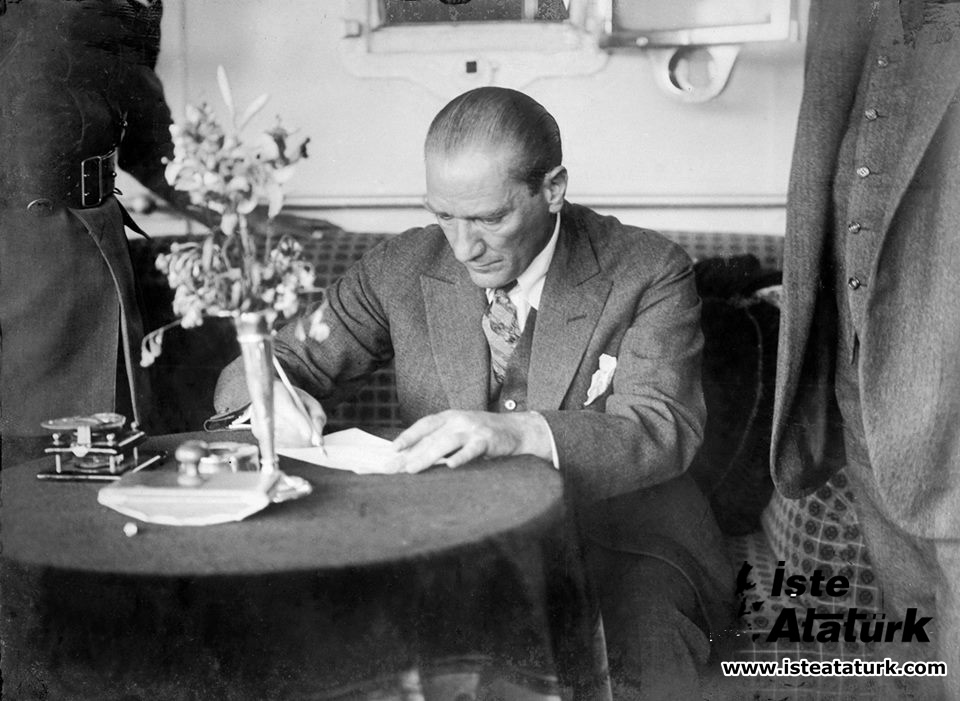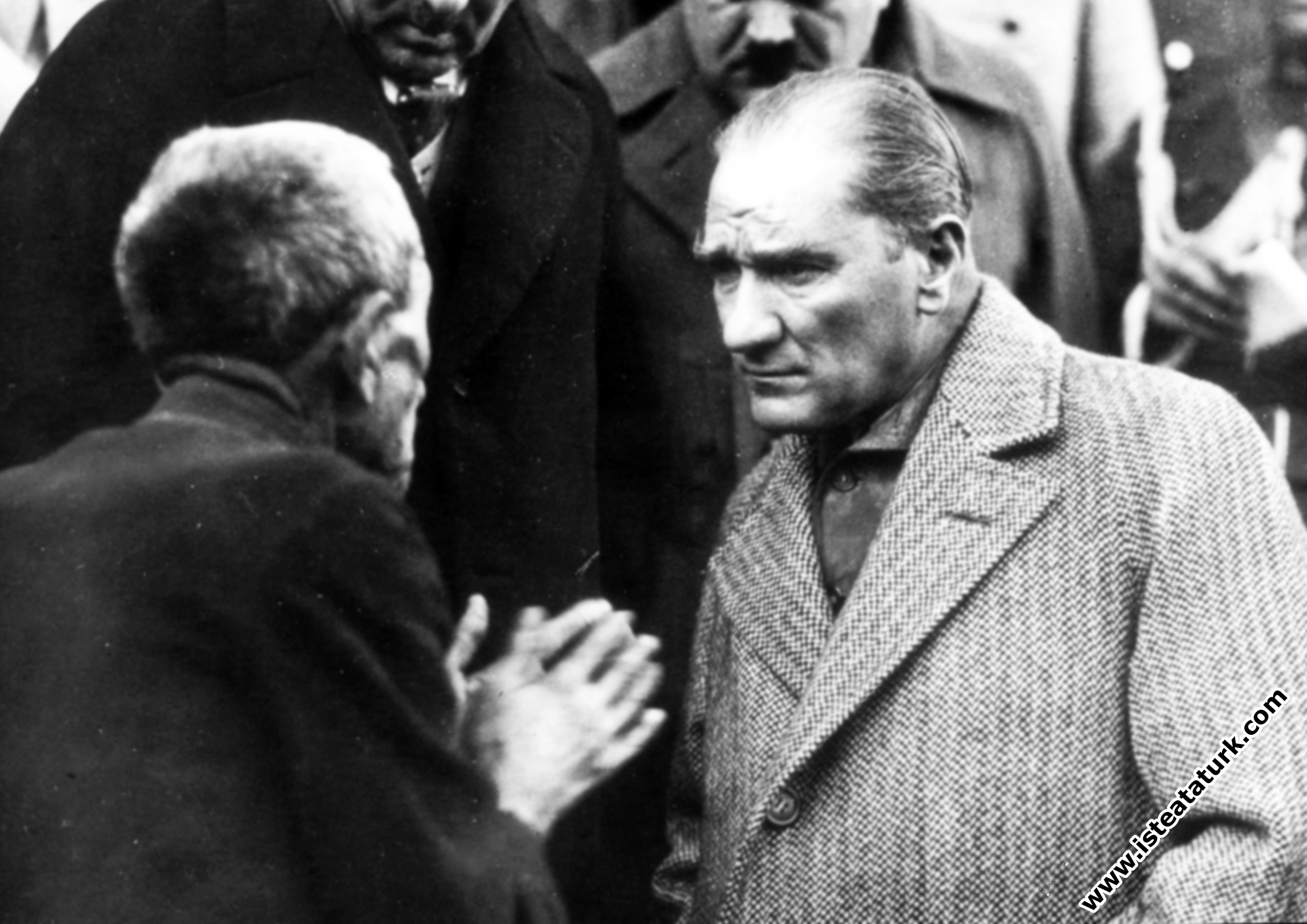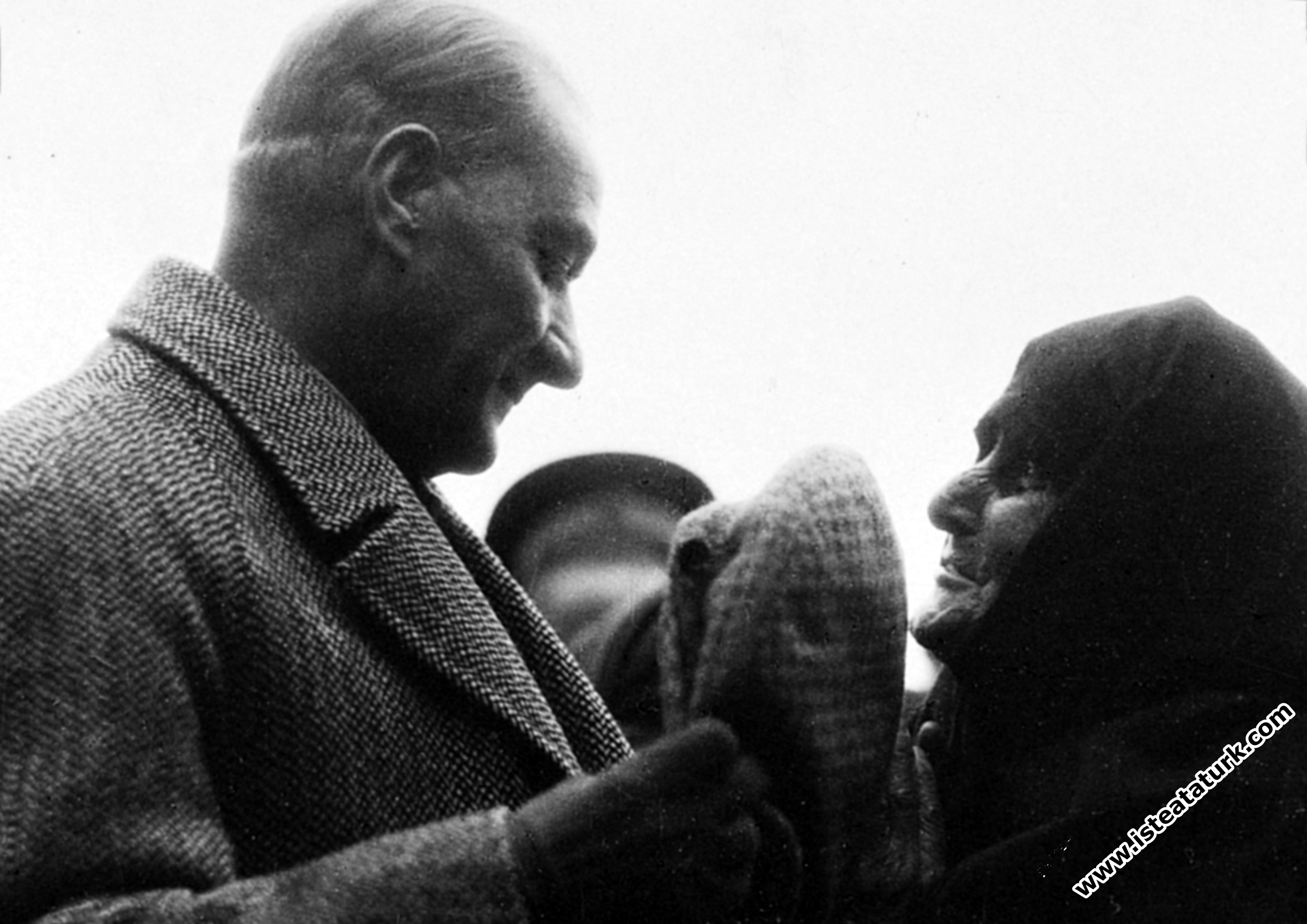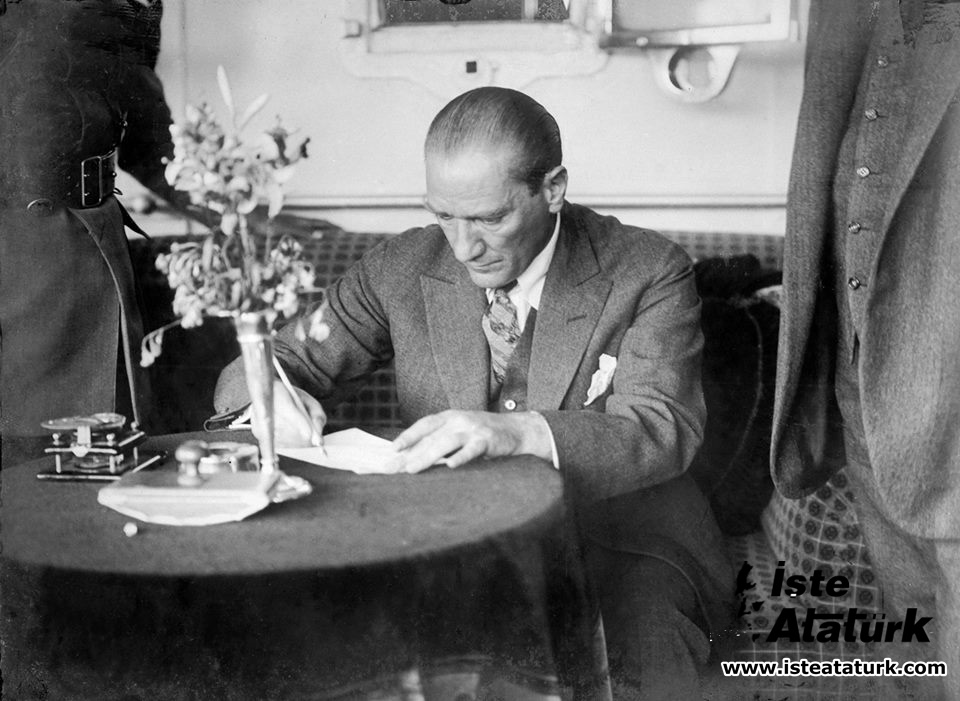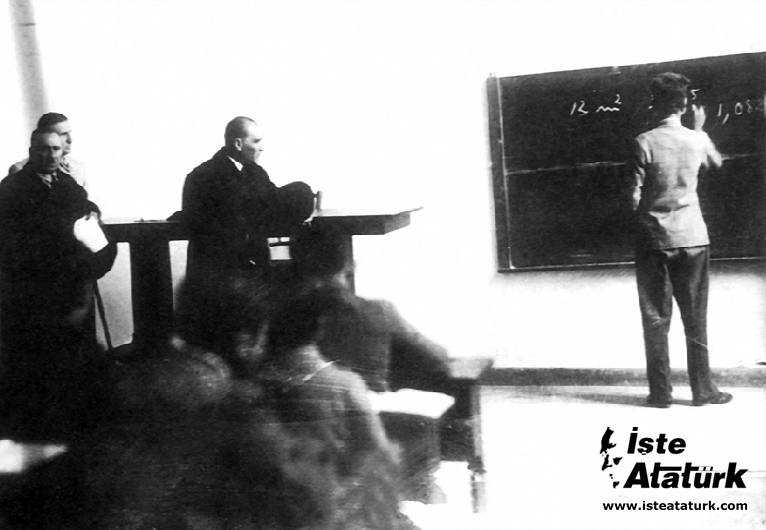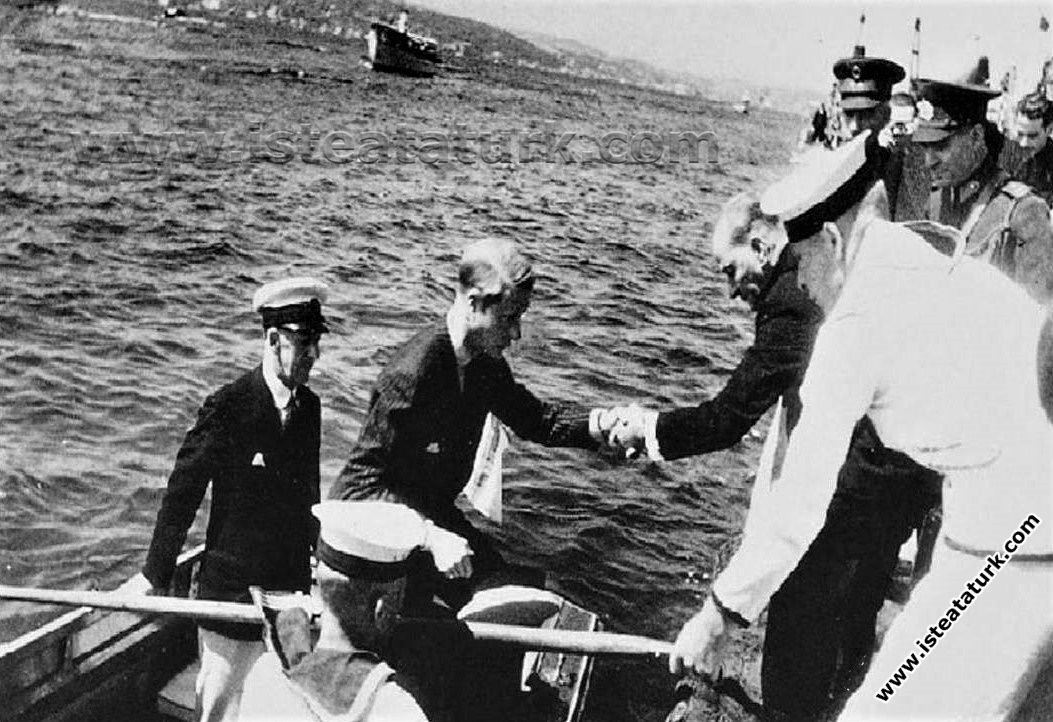
Peace at home peace in the world
Character Size
"The aim of the republic in foreign policy is to preserve national peace and live in safety" Mustafa Kemal Atatürk
PEACE AT HOME PEACE IN THE WORLD
I. Peace and War in General
Relationships between people are either collision, coercion or harmony. The natural result of conflicts of interest is struggle, war. Conflict of interest is peace. Peace (peace) and war (war) are two separate institutions that are diametrically opposed to each other.
In short, peace is social order, security, respect for law and vested rights. It is the establishment of balance in social life.
Struggle, the most serious war, is anarchy, confusion, indecision and imbalance.
People prefer it to meet their peace or war interests for different reasons.
In its technical sense, war is the armed struggle of a regular group of people (the State) against another human community (the State) by force, in order to impose its will.
Human societies either know a real purpose or use it as a means towards an end. War has always been dangerous and has contributed to the death of people, the increase in misery, and the increase in suffering.
War and peace follow the development course of social life as social events. Changes in the understanding of war and peace have also caused changes and developments in the contents of these institutions.
In our age, the total nature of the war, wearing down the victors as well as the defeated, affecting the states outside the war, reduced the ambitions to use the war as a national political instrument, first the war was made illegal with the Briand-Kellog Pact, and then the United Nations Charter (Treaty). ) with a wider and more comprehensive ban.
According to Alexander Rustow, “War is not a dictate of human nature. War has not always been present and need not always have been. World peace is not an empty dream.” 3
Just as war has taken on a total nature, peace also constitutes a whole because the world has shrunk in the face of new technical developments. This integrity announces its existence and nature to all people, not only in terms of interstate relations, but also in terms of the internal life of each nation. It is not possible to separate peace as inner peace and outer peace. At the same time, it is not possible to distinguish between European peace, American peace, British peace, Soviet peace.
“The problem of peace in all kinds of societies, from the formation of the family to the community of states, which constitutes the highest stage of social life, is one and the same in terms of both its principle and technique4.
In the period before the twentieth century, peace and war were considered only as a matter of politics, and politicians were busy with it. In this period, the main problem was whether the initiatives of politicians were in compliance with the Law of the States.
Today, peace and war has ceased to be a matter of diplomacy and has become a social, economic, cultural and psychological problem in terms of the crises created in the society.
Diplomatic activities alone are not enough to ensure peace. First of all, it is necessary to eliminate the factors that will cause war. The most important of these measures is not to resort to force and the threat of force, to resolve conflicts by peaceful means, to ensure economic and social cooperation, and to guarantee fundamental human rights and freedoms in every country. Apart from this, it is also to save national orders from the effects of hostile ideologies and life views.
People who have their fundamental rights and freedoms establish a real peace with a fair balance of interests in cooperation.
Human life, family life, city life, national life and the life of the international community are very intricate and interconnected. Shaking and demolishing the foundations of any one of them immediately affects the others and upsets the balance. The peace that is desired to be established today is a synthesis or symphony of peace that concerns and is based on every stage of social life and all kinds of activities5.
The Republic of Turkey sensed this fact from the very first days, and directed its domestic and foreign policy accordingly. The motto “Peace at Home, Peace in the World” expresses Turkey's thoughts and policies on the issue of peace very well.
II- The Meaning and Scope of Peace at Home and Peace in the World.
Peace at home, peace in the world is a basic principle of the Turkish Revolution and the basis of Turkish foreign policy. The principle of “Peace at Home, Peace in the World,” included in our 1961 and 1982 Constitutions, which has a guiding quality in state administration and all kinds of state activities, is not only a password, but also a superior rule of law.
The principle of “Peace at Home, Peace in the World” aims at peace and tranquility, living in security at home on the one hand, and international peace and security on the other hand, and is the fundamental basis of both domestic and foreign policy.
As Atatürk stated, “External politics is closely related to the formation of a committee of society. Because external policies that do not rely on the internal establishment are always doomed. The stronger the internal formation of a committee, the stronger its foreign policy will be in the same proportion.” 6
Again, as Atatürk put it, “External politics must be in harmony with the internal organization.” 7
In this respect, it is necessary to examine and evaluate the principle of "Peace at Home, Peace in the World" together with domestic and foreign policy.
“Peace at Home” means that people live in peace and security, in a way that suits the human personality. First of all, “Peace at Home” refers to the humane life of that person in the country, and the recognition of the necessity of human dignity.
“Peace at Home” envisages order in social life, citizens' trust in the state, and the state's security and authority in the country. The rule of law and rule of law in the country is the most natural result of the principle of "Peace at Home". “Peace at Home” also imposes obligations on the State for its citizens to have the opportunity to live in peace and security.
Atatürk found the way to make Turkish people happy in peace in the Republic. According to Atatürk, the Republic, with its new and solid principles, was the harbinger of a completely new life in terms of the security it created in the original ideas and spirits, as well as putting the Turkish nation on a safe and sound future8.
“Peace in the World”, on the other hand, aims to preserve and ensure international peace and security, to consider the indivisibility of international peace, to consider all of humanity as one body and every nation as a member of it. “Peace in the World” envisages not resorting to force and the threat of force in international relations, and peaceful resolution of international disputes.
“Peace in the World” means leading all nations to peace, prosperity, happiness and a more advanced age of civilization.
"Peace at Home, Peace in the World" is the love of humanity and understanding of humanity underlying its principle.
When Atatürk said, “We are not the enemy of anyone, we are the enemy of those who are the enemy of humanity”9, he talked about a unique love of humanity and respect for human beings.
Atatürk's value to the human family in peace and security was most clearly expressed in his speech with Romanian Foreign Minister Antenescu in 1937:
“As much as he thinks about the existence and happiness of the nation he belongs to, he should think about the peace and welfare of all the nations of the world, and work as hard as he can to achieve the happiness of all the nations of the world, no matter how much he values the happiness of his own nation. Because working for the happiness of the nations of the world means trying to ensure their own peace and happiness in another way. If there is no peace, clarity and good livelihood in the world and among the nations of the world, a nation is deprived of peace no matter what it does for itself... We cannot know that an event that we think is the furthest away will not come into contact with us one day.” 10
“Peace at Home, Peace in the World”, in its broadest and most widespread sense, also refers to the technical term collective security, the preservation and continuity of international peace.
III- Practices and Evaluations in Domestic and Foreign Policy.
“Peace at Home, Peace in the World” was mentioned for the first time in the declaration of Mustafa Kemal Pasha (Atatürk) as the Chairman of the CHP to the nation on 20. April 1931 due to the election11.
“I think the following short sentence is enough to clearly express the general policy of the Republican People's Party:
“We are working for peace at home, for peace in the world” 12.
This declaration, published with Atatürk's signature, states the principles of the policy of a political power, at home and abroad, led by Atatürk.
In his response to the message sent by US President Roosevelt to the Turkish Nation on the occasion of the Tenth Anniversary of the Republic in 1933, Atatürk refers to the principle of peace at home and peace in the world:
“The aim of peace at home, peace in the world, which is one of the most fundamental hopes of the Republic of Turkey, must be the most essential factor in the prosperity and progress of humanity and civilization. It is a matter of pride for us to have served and served it as much as we could.” 13
In this message, Atatürk does not only refer to the principle of peace at home and peace in the world, but also emphasizes that this principle is the most essential factor in the welfare and development of humanity and civilization. He also states that serving this principle is worthy of pride. To be clear, believing in peace, valuing it in politics, means serving humanity. Expressing this in mutual messages with a head of state also means serving common purposes on the same issue with a head of state playing a role in world politics.
The principle of “Peace at home, peace in the world” has been followed as a state policy of the new Turkey since its foundation. However, the important point that draws our attention here is that during the years of the National Struggle, the main goal, the first goal, was to liberate the homeland, whose borders were determined in the National Pact, from occupation, to ensure national independence, to make a just peace that respected Turkish national interests, and it was a political attitude that should be followed first.
During the years of the National Struggle, Atatürk gave priority to the liberation of the homeland in his speeches and linked the establishment of a continuous and stable peace to this. In his various speeches, he focused on this issue and determined the principles of our national policy.
As an example, as Mustafa Kemal Pasha stated in a speech he made in the Grand National Assembly of Turkey on 8 July 1920, “Sirs, we follow a purpose. This purpose of ours has long been expressed on various occasions. I am repeating it now. To preserve the independence of the nation and the state. In this, honor and honor will be completely implicit. It is to preserve the integrity of our nation independently within certain borders. We are fighting for this”14 statements express this fact. Mustafa Kemal Pasha from the Commander-in-Chief, Mustafa Kemal Pasha, the Speaker of the Grand National Assembly of Turkey, made the following statement in the COE-DAT on September 19, 1921, after the Battle of Sakarya, which could be an example of war history, was won:
“Undoubtedly, we cannot lay down our weapons until we ensure our law. However, it should not be assumed that we are supporters of extremist warfare. There can be no greater injustice than such a view. On the contrary, we want to make peace with everyone. Lords! We resorted to every means to ensure our law of peace. We made no mistake in this regard. However, they concealed all our good intentions and seriousness in the eyes of the world of civilization. And they greeted us with a treat that could only be applied to the elementary school and with some childish and meaningless threats. Lords! The whole world should know that the people of Turkey, the Turkish Grand National Assembly and its Government cannot tolerate the treatment of servants. Like every civilized nation and government, the demand for the recognition of its existence, freedom and independence is unquestionably an oppressor. And that's what the whole case is about. We are not warriors. We are peace-loving. And we want to enter the establishment of peace as soon as possible and help and serve him 15.
These statements are openly announced by the Speaker of the Grand National Assembly of Turkey, Mustafa Kemal Pasha, who has very wide powers. “We don't want war, we want peace. We are ready to make peace and I think there is no reason to prevent this.”16 He once again announced the issue to the world public opinion in the same speech.
On March 1, 1922, before the decisive victory was won, Atatürk expressed our loyalty to the National Pact, which determined our national borders and envisaged our independence, in his speech at the Grand National Assembly of Turkey regarding the opening of the Assembly:
“As in our internal politics, our main aim in our foreign policy consists of the National Pact. We immediately consider as friends those who accept the National Pact and confirm our independence in the field of materiality and spirituality, and continued, “Sirs! There is no infringement of the law of an immature state in our politics. However, we defend our rights, our lives, our country, our honor, and we will.”17
The great victory has been won, the armed conflict has come to an end. However, there are centuries to be seen with western Europe. A peace conference was held in Lausanne, but no results were obtained in the first period. In his speech on March 1, 1923, on the occasion of the opening of the Turkish Grand National Assembly, Mustafa Kemal Pasha insisted on peace, an honorable peace.
“If we achieve a peace on the humble basis laid down by the nation for life and independence, then we will concentrate all our strength (power sources) and our semere-i istihsalât (products of production) on the basis of development and development.”18
Atatürk also clearly stated that he would reach peace as soon as possible and turn to the internal order of the country. Talking about foreign policy in his same speech, he said, “It is obvious that the politics we follow is the politics of peace. The attempt to trample and trample our country without relying on any rights and justice, was failed due to the self-sacrificing and devoted effort of our victorious army, and our nation saved our beloved homeland by gaining a victory that is rarely recorded in history.
Seeking to take advantage of every opportunity to establish a world of peace, our government, after the great victory, withheld the operation and secured an armistice, and with long discussions and difficulties, it participated in the Lausanne Conference, which was opened on the twentieth of the year (20 November), with a genuine desire to participate.” 19
After the peace treaty signed in Lausanne on July 24, 1923, keeping the peace and complying with the treaties were considered as a principle.
Atatürk openly stated in his opening speech to the Turkish Grand National Assembly on November 1, 1929, “Our honest and open policy abroad is based on the idea of peace. Seeking to settle any of our international issues through peaceful means is a way that suits our interests and mentality. In order not to be confronted with an offer other than this way, we attach great importance to the principle of safety and its means. He will not be left behind from any service within the power of the Republic of Turkey for the preservation of the international atmosphere of peace.” 21 The new Turkey sincerely and honestly defended the ideal of peace after Lausanne, as required by its national interests. However, Atatürk, who evaluated the political events from a very realistic point of view, both in ensuring peace in foreign policy and in establishing an order that would provide peace to the citizens in domestic politics,
Atatürk, while opening the Turkish Grand National Assembly on November 1, 1928, explained the following issues regarding foreign policy.
“Lords, the motto of honesty in our foreign policy, attention to the safety of our country and the innocence of its development, guides our movement. There cannot be a situation that can be explained more easily than that a country that is undergoing fundamental reform and development seriously desires peace and tranquility both in itself and in its environs. In our foreign policy inspired by this sincere desire, the ability to defend the innocence, security and rights of the citizens against any encroachment is the point we especially favor. We attach great importance to maintaining our land, sea and air armies in a force that will keep peace and security in this country. The government of the Republic makes a special effort to conclude security agreements between nations. We expressed our consent with the same sincerity for joining the Kollog agreement that was offered to us.” 22
According to Atatürk, “the first and most important condition for the development of international political security is the sincere unity of nations, at least in the idea of preserving peace.”23
Atatürk sees the basic condition of international peace in international understanding and mentality. They are convinced that peace will be preserved by the sincere unification of states in the idea of maintaining peace. This speech made in 1932 states that Atatürk had some hesitations regarding the future of peace. These hesitations were made clearer in the opening speech of the 1934 Assembly:
“International policymakers have been concerned about protection over the past year; Therefore, armament was accelerated in all countries.
Therefore, the government of the Republic, while trying to consolidate its national protection power, did its best not to deviate from the path that gives hope for the nations to work together, so that the peace is not shaken.” 24
On May 9, 1935, while opening the CHP's Fourth Great Congress, Atatürk said, “The aim of the Republic in foreign policy is to preserve national peace and live in safety”25.
After the Lausanne Peace, the principle of "peace at home, peace in the world", especially the principle of "peace at home", showed great progress, ways to keep Turkish people happy and safe were searched. Atatürk expressed these happy developments in his opening speech at the Grand National Assembly of Turkey on November 1, 1937:
“We are pleased to see that the Republican regime has ensured the best establishment of peace and tranquility in our country. Citizens and residents of this dormitory make maximum use of the freedom, welfare and happiness opportunities prepared for them under the equal conditions of the laws of the republic.
I am happy to say in your presence that there is no room to think about any obstacles that could prevent our nation from reaching the high level of civilization and prosperity it deserves.” 26
On the same day, in the same speech, Atatürk stated that security in the country was given a great deal of attention:
“As it is known, we consider the safety of individuals within the security of the homeland to the extent it deserves.
This security is available in the most advanced way, under the guarantee of the laws of the Turkish Republic and the Turkish judges.”27
In his speech in 1937, Atatürk tried to reveal Turkey's contribution to international peace in terms of foreign policy:
“A harmonious stability and development stands out in the relations of the Government of the Republic with its neighbors and other large and small states.
Wherever there was an address on the way to peace, Turkey welcomed him with danger and did not withhold his help.” 28
Likewise, in the same speech, he aimed to help the ideal of peace by referring to the League of Nations, which is responsible for ensuring international peace and security:
“In the difficult phases that the League of Nations is going through, the Government of the Republic has not deviated from the ideal of peace by showing its loyalty to this transnational institution in every field.” 29
Turkey has served peace by trying to resolve its international disputes through peaceful means and by not resorting to force and the threat of force.
The two most important disputes, the Hatay Case and the Montreux Straits Convention, were resolved with the mutual consent of the states concerned, and Turkey respected the rules of international law.
The inadequacy of the Straits Convention held in Lausanne necessitated a reorganization, and the conference convened in Montreux with the approval of the relevant states accepted the Montreux Straits Convention on 20 July 1936.
Both at the opening and during the closing of the conference, the delegates of the participating states expressed and praised Turkey's peaceful attitude and its efforts to amend the Straits Convention with the mutual consent of the parties.
One of the most interesting of these speeches is the words of the Greek representative Politis, vice president of the conference, Professor of International Law:
“Friends, when thrown into a fight, wish them success; next to them, it is tried to direct the work to the good path by facilitating their behavior and actions and by adding their own power to their power as much as possible. In my eyes, no country could have deserved such assistance more than Turkey, which has been connected to my country for years with unshakable bonds of friendship. After this success, Turkey emerges from here, morally elevated in the eyes of the world, as the standard-bearer of international righteousness, the guardian of reconciliation among nations, and the advocate of peace-making. Everything that glorifies Turkey in the eyes of the world is a gain for its friends; it was this feeling that gave me the strength to work as best I could here; because Turkey's gain is indirectly my country's gain as well.” 30
At the Montreux Straits Conference, Turkey's exemplary peaceful attitude was expressed with bright words by many delegates. My wish is that statesmen such as Politis, the esteemed scholar and diplomat, who look for peace, not war, and find the happiness of humanity in it, and who look at a country like Turkey that defends peace as a friend, direct their country and serve peace for the benefit of humanity.
At the opening of the Montreux Straits Conference, the speech of Turkey's representative, Foreign Minister Tevfik Rüştü Aras, about our design for the Straits also shows how peaceful Turkey is to serve world peace:
“I believe that the policy of Kemalist Turkey has given enough evidence to be considered a realistic policy of peace and well-being. Our design will allow us to see once again our sincere desire for cooperation.”31
Peaceful Turkey applies “peace at home, peace in the world” not only as a principle but also as a political motto, and seeks the happiness of humanity in it.
As Atatürk expressed, peace requires special attention and care in the life of the nation and in international relations.
“Peace is the best way that leads nations to prosperity and happiness. But once this concept is captured, it requires constant care and diligence and the preparation of each nation separately. 32
CONCLUSION
We need to come to a conclusion in the light of the explanations we have made about "Peace at Home and Peace in the World", which is our subject of study.
1 - Peace is an inevitable order of international life today. Separating Peace at Home and Peace in the World means separating these two social orders from each other. Peace is a whole, indivisible, indivisible. The foreign policy of the country that provides peace at home results in success. The mutual effects of national life and international life make it necessary to evaluate peace as a whole. With the removal of hostilities in the state's own country, order and security prevails, and in a word, peace is achieved in the country. The establishment of peace in the country, on the other hand, develops with civilization.
Peace necessitates the rule of law, righteousness and justice. Peace does not envisage recourse to force and the threat of force, but to resort to legal and legitimate means.
According to Andre de Maday, “the war we condemn today was a necessary theory in the past, it was invented by the human mind. Today, the same human mind will substitute peace for war.” 33
Peace is essential for human life today. The only way to live peacefully and comfortably is peace.
2- There is no other state that adheres to and sincerely abides by the Law of Nations, both by belief and by its action, than Turkey of the Revolution, which made the motto "Peace at Home, Peace in the World" a guide in relations between states.
Turkey sees the real and solid foundations of its national interest only in the provision of the general interest of humanity.
The general aim and meaning of Atatürk's revolution is to work and help to establish the legal order both at home and abroad. 34
prof. These words, rightly expressed by Mesut Alsan, are the natural result of a scientific evaluation.
The same opinion and evaluation, the famous Ord. prof. Dr. It is also done by Alexander Rustow in his study titled “The Sociological Nature of Harbin”.
The same author, in his review written in 1939, states that the conditions for the abolition of the war and the establishment of humanity's unity have not yet been met, and that war poses a danger at any moment. However, what can be done for world peace also emerges as a problem. The famous scholar also mentions the danger it will pose for the preservation of peace at all costs and explains that peace cannot be served in this way. According to A. Rustow, this situation makes war easy and safe for others because of our own weakness35.
After these explanations, the famous teacher A. Rustow touches on the historical struggle of the Turkish nation:
“A nation will serve peace in the best way by being ready to sacrifice its life for its rights and independence, while at the same time protecting its rights through peaceful means, through reasonable agreements, brave negotiations, and by staying within the framework of the agreed agreements and assumed obligations.
Apart from Turkey, there is no country whose foreign policy sets an example with a high scale in terms of the realization and reconciliation of all these ideals.
The new Turkey did not find itself in an easy situation at all. He would demand back many of his rights, which he had been deprived of unfairly. He did not sacrifice any of these rights. However, he knew how to reclaim all of these rights by keeping peace, respecting contractual fidelity, and observing absolute legitimacy in terms of international law. It is his right to be genuinely proud of this achievement. And in the face of this success, we sincerely wish the new Turkey to be blessed with an honorable and successful peace in the future, on the way to being prepared for war with wisdom and understanding of responsibility.” 36
3- Turkey's pursuit of a policy of peace and its use of the motto "Peace at Home and Peace in the World" is the result of its own national interests.
Turkey's main goal at the beginning of the National Struggle, as stated before, was the liberation of the country from the enemy occupation, the attainment of national independence and the realization of the goals envisaged by the National Pact.
The success achieved in Lausanne led Turkey to pursue a policy of peace.
According to ZM Alsan, “Because the Treaty of Lausanne was concluded not between the states divided into two groups as the victorious and the defeated, but between the parties having the same rights and powers to defend their rights and interests, it established a beneficial peace for all parties and despite the worldwide tremors, the Treaty of Lausanne was concluded. preserved its virtuous existence. Situations that needed to change according to the new conditions and necessities of international life, such as the Straits issue and the Hatay issue, were also possible in peace and with the consent of the parties. There is no doubt that the Revolution Turkey's "Peace at Home, Peace in the World" hope and the belief that human ideals and private interests can only be achieved by respecting public interests played a major role in this." 37
Peace at Home, Peace in the World has not only brought peace to Turkey, but also enabled peace and security in the country. This policy has combined our national interests with the interests of humanity.
4- Turkey's peace policy is not imaginary and theoretical, but realistic, successful in practice and based on solid foundations.
Atatürk, seeing the weakness of international organizations in maintaining world peace, expressed the need for the nation to rely on national resources and the nation's own strength in achieving peace.
As explained in the definition of national politics, relying on one's own strength means the army's readiness for duty and service.
This situation is clearly expressed in one of Atatürk's speeches:
“As I pointed out and explained last year, the efforts to equip our invincible army, which is not only the protector of the homeland and the regime, but also an agent of peace and an education center in the widest and truest sense, have accelerated with the latest system of weapons and motor vehicles.”38
This realistic view of Atatürk should seek the guarantee of international peace in the effectiveness of self-defense wars, as well as in the inadequacy of the views that seek the sanction of international organizations. A strong military is also needed to ensure success in enforcing international sanctions against aggression, as in the case of Korea in 1950.
By relying on the principle of "Peace at Home, Peace in the World", and relying on the national army and national power, Atatürk became the follower of a more realistic, more solid and confident policy.
As a matter of fact, the same evaluation is also included in the words of A. Rustow that we have mentioned before. As a result, the famous professor expresses his sincere wishes that Turkey will continue to serve in an honorable and successful way of peace by being prepared for war.
1 Andre de Maday, Sociology of Peace, Introduction to the Philosophy of International Law, Paris, 1913, s. 1-9.
2 Charles Rousseau, Droit International Public, Paris, 1953, p. 537 et al. Louis Delbez, Les Principes generaux du Droit International Public, 3rd edition, Paris, 1964, p. 509 et al.
3 Alexander Rustow, The Sociological Nature of Harbin, Gift to Professor Cemil Bilsel, İst, 1939, p. 521.
4 Zeki Mesut Alsan, New Developments in International Law, Ankara, 1948, pp, 206-207.
5 Zeki Mesut Alsan, New Developments in International Law, Ankara, 1948, p. 116.
6 Enver Ziya Karal, Thoughts from Atatürk, Ankara 1966, p. 123. For the translation of the text into today's language, see. Utkan Kocatürk, Atatürk's Ideas and Thoughts, 3rd Edition, Ankara, 1984, p. 313.
7 Enver Ziya Karal, supra, p. 123. Utkan Kocaturk, supra, p. 313.
8 Utkan Kocatürk, Atatürk's Ideas and Thoughts, p. 59.
9 Utkan Kocaturk, supra, p. 323.
10 Utkan Kocaturk, supra, p. 327-328.
11 Mehmet Gonlubol, Atatürk's Foreign Policy; Objectives and principles, Atatürk Yolu, 1981, p. 269.
12 Atatürk's Circular, Telegram and Declarations, C. IV, (1917-1938), p. 549-552.
13 Atatürk's Circular, Telegram and Declarations, IV, (1917-1938), p. 560.
14 Atatürk's Speeches and Statements, c. Work. 78.
15 Atatürk's Speeches and Statements, c. Work. 180-181.
16 Atatürk's Speeches and Statements, c. Work. 181.
17 Atatürk's Speeches and Statements, c. Work. 229.
18 Atatürk's Speeches and Statements, c. Work. 274. 19 Atatürk's Discourses and Statements, c. Work. 290-291.
20 Atatürk's Speeches and Statements, c. Work. 319.
21 Atatürk's Speeches and Statements, c. Work. 347.
22 Atatürk's Speeches and Statements, c. Work. 342-343.
23 Atatürk's Speeches and Statements, c. Work. 357.
24 Atatürk's Speeches and Statements, c. Work. 364.
25 Atatürk's Speeches and Statements, c. Work. 367.
26 Atatürk's Speeches and Statements, c. Work. 377.
27 Atatürk's Speeches and Statements, c. Work. 378.
28 Atatürk's Speeches and Statements, c. Work. 388.
29 Atatürk's Speeches and Statements, c. Work. 388.
30 Montreux Straits Conference, Minutes, Documents, (Translated by Seha L. Meray, Osman Olcay), Ankara, 1976, p. 272.
31 Montreux Straits Conference, Minutes, Documents, (Translated by Seha L. Meray and Osman Olcay), Ankara, 1976, p.
25.
32 Atatürk's Speeches and Statements, c. Work. 396.33 Andre de Maday, Sociologie de la Paix, Foreword, p. VIII.
34 Zeki Mesut Alsan, New Developments in International Law, foreword, p. VII-VIII.
35 Alexander Rustow, The Sociological Nature of Harbin, p. 521.
36 Alexander Rustow, a.g.e., s. 521-522.
37 Zeki Mesut Alsan, supra, p. 209-210.
38 Atatürk's Speeches and Statements, c. Work. 395.
Prof. Dr. Hamza Eroğlu
Source: ATATÜRK ARAŞTIRMA MERKEZİ DERGİSİ, Sayı 2, Cilt: I, Mart 1985
